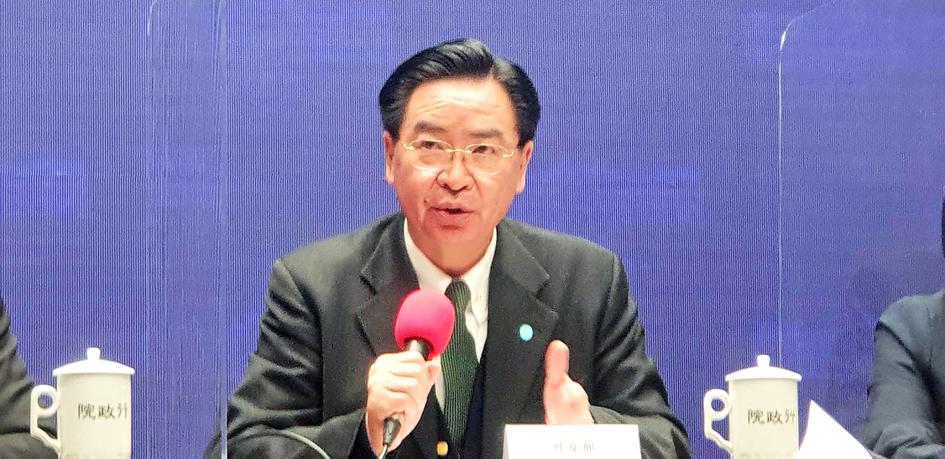Minister of Foreign Affairs Joseph Wu (吳釗燮) yesterday expressed regret over the riots at the US Capitol on Wednesday, while reminding Taiwanese in Washington to remain on high alert.
Asked to comment on the riots at a news conference at the Executive Yuan in Taipei, Wu said that it was regrettable to hear of the incident and that the ministry would continue to monitor the situation.
The Taipei Economic and Cultural Representative Office in the US has issued alerts reminding Taiwanese in the US capital to be on heightened alert and to comply with curfew measures introduced by Washington Mayor Muriel Bowser.

Photo: Lee Hsin-fang, Taipei Times
Wu said that the representative office would do its best to provide whatever assistance Taiwanese in Washington should require.
Asked about Taiwan’s stance on the unrest, Wu said: “We don’t have anything more to say.”
Meanwhile, a Taiwan-US virtual dialogue on political and military affairs was held yesterday morning.
The US Department of State on Tuesday, in a rare high-profile announcement, had said that US Assistant Secretary of State for Political-Military Affairs Clarke Cooper would give the opening remarks at the event.
Political analysts said that regional safety and US-Taiwan arms sales would likely have been discussed during the meeting, but Wu declined to comment on any details, only saying that the dialogue had been successfully concluded.
Deputy Minister of National Defense Chang Kuan-chun (張冠群) said that the talks have been held regularly over the years and that they serve to help both sides arrive at measures that would facilitate collaborations in a more practical manner.
In contrast with the state department’s announcement, the Executive Yuan only said that the administration of President Tsai Ing-wen (蔡英文) was witnessing a peak in US-Taiwan relations.
Both sides have worked closely on regional security and trade issues, and any international collaborations that would aid in efforts to maintain Taiwan’s democracy would be fully supported by the government, the Executive Yuan said.

MAKING WAVES: China’s maritime militia could become a nontraditional threat in war, clogging up shipping lanes to prevent US or Japanese intervention, a report said About 1,900 Chinese ships flying flags of convenience and fishing vessels that participated in China’s military exercises around Taiwan last month and in January have been listed for monitoring, Coast Guard Administration (CGA) Deputy Director-General Hsieh Ching-chin (謝慶欽) said yesterday. Following amendments to the Commercial Port Act (商港法) and the Law of Ships (船舶法) last month, the CGA can designate possible berthing areas or deny ports of call for vessels suspected of loitering around areas where undersea cables can be accessed, Oceans Affairs Council Minister Kuan Bi-ling (管碧玲) said. The list of suspected ships, originally 300, had risen to about 1,900 as

Japan’s strategic alliance with the US would collapse if Tokyo were to turn away from a conflict in Taiwan, Japanese Prime Minister Sanae Takaichi said yesterday, but distanced herself from previous comments that suggested a possible military response in such an event. Takaichi expressed her latest views on a nationally broadcast TV program late on Monday, where an opposition party leader criticized her for igniting tensions with China with the earlier remarks. Ties between Japan and China have sunk to the worst level in years after Takaichi said in November that a hypothetical Chinese attack on Taiwan could bring about a Japanese

MORE RESPONSIBILITY: Draftees would be expected to fight alongside professional soldiers, likely requiring the transformation of some training brigades into combat units The armed forces are to start incorporating new conscripts into combined arms brigades this year to enhance combat readiness, the Executive Yuan’s latest policy report said. The new policy would affect Taiwanese men entering the military for their compulsory service, which was extended to one year under reforms by then-president Tsai Ing-wen (蔡英文) in 2022. The conscripts would be trained to operate machine guns, uncrewed aerial vehicles, anti-tank guided missile launchers and Stinger air defense systems, the report said, adding that the basic training would be lengthened to eight weeks. After basic training, conscripts would be sorted into infantry battalions that would take

DEEP-STRIKE CAPABILITY: The scenario simulated a PLA drill that turned into an assault on Taiwan’s critical infrastructure, with the launchers providing fire support Taiwan yesterday conducted this year’s first military exercises at Longsiang Base in Taichung, demonstrating the newly acquired High Mobility Artillery Rocket System’s (HIMARS) ability to provide fire support and deep-strike capabilities. The scenario simulated an attack on Penghu County, with HIMARS trucks immediately rolling into designated launch areas and firing barrages at the Wangan (望安) and Cimei (七美) islands, simulating the provision of fire support against invading forces. The HIMARS are supposed to “fire and leave,” which would significantly increase personnel and equipment survivability, a military official said. The drill simulated an exercise launched by the Chinese People’s Liberation Army (PLA) Eastern